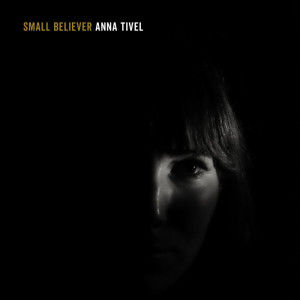 Anna Tivel, whose Heroes Waking Up rose to the top of my best-of list in 2016, has a new record out already this year, and Small Believers lives up to the high mark set by that record.
Anna Tivel, whose Heroes Waking Up rose to the top of my best-of list in 2016, has a new record out already this year, and Small Believers lives up to the high mark set by that record.
Portland’s Anna Tivel is that rare songwriter who can put together a song like an award-winning short story writer. She has the keen eye for human behavior of a John Prine, an ear for a folk melody, and a vocal delivery that can be intimate, sometimes even whispery, without ever being childlike or cutesy. It’s more like she’s acknowledging the sacredness of the private moments she sings about, reverently sharing them rather than shouting them from the rooftop.
Tivel has just the right amount and kind of help in putting her songs on this record, starting with Austin Nevins who produced and plays a host of instruments including guitars, pump organ, banjo, lap steel and glockenspiel. The arrangements, like the songs themselves, tend toward minimalist. Jeffrey Martin provides backing vocals, Sam Howard bass, Chris Johnedis drums, Rob Burger keys and Matt Douglas clarinet.
But all of the expert help in the world would be for naught without these beautiful, compact narratives put to music and verse. It starts with “Illinois,” a sad little story about a sad, long drive.
“This one is for a good friend who moved a long way to be with someone who ended up really breaking her spirit,” Tivel says. “It’s about the hope of making a new life, the promise of real love, and the terrible let down and destruction of abuse. I wrote it imagining her driving back home, hoping so hard that she would, but knowing how blindingly difficult it is to leave, how much shame and hurt and hope and fear is involved.”
Tivel seems to write a lot of that kind of sad song. They don’t come much sadder than “Alleyway,” a rambling first-person narrative of a homeless and probably addicted woman abandoned by her lover. Imagine someone so lost and lonely that her only good dreams are of sharing a bottle in an alley, but she clings to that memory to keep out much worse thoughts. Tivel can do more to set a mood with just a few words than many can do in a whole raft of verses, like the opening lines of this one: “Smoke against the window pane / just the semis breathing on the interstate / and the gray upon the gray of October…”
She catches the quiet dignity of the marginalized in a song like “Riverside Hotel,” about a homeless Vietnam vet who spends his days watching a new hotel rise on the riverbank of a town that’s probably a lot like Portland. And of course the sad irony of no room at the inn for him once it’s completed. And she catches the desperate unfairness of the disappearance of blue collar jobs in the intense “Dark Chandelier,” in which a laid-off factory worker seeks relief in a terrible self-destructive act.
Unrelieved, such sad songs might be oppressive, but Tivel leavens them with some that are quiet portraits of contentment or something like it. Like the slightly lonely but homey picture of domestic peace as she tries to write a song on “Saturday Night.” “Tomorrow’s asleep on the front steps / and yesterday dreams in the street / in the basement apartment a shadowy man / he just stares at the wall he can’t sleep / and me I’m just part of the darkness / just trying to get something right / on a Saturday night…” It’s a lonelier home in “Blue World” as she sings the heart of someone whose loved one has taken to the road to find success of some kind, and waits with welcoming arms and heart not knowing if they’ll return.
She draws from what one imagines is people in her own life on the bluesy shuffle of “Last Cigarette,” which tells of the day in the life of a restaurant worker. Tivel does the odd waitressing job and also delivers meals on wheels, which I bet provided the details for the slow, quietly sad waltz of “Ordinary Dance.” She brings you up the front steps of an old house to its resident whom “nobody remembers any more,” but who has a lifetime of memories in the home.
Tivel has included a topical song, too, something a little different. This one actually rocks, as Johnedis lays down a Bo Diddly beat on the toms and Nevins adds electric guitar accents. I imagine the song, called “Highest Building,” fairly demanded to be written, perhaps as she watched the news on TV or online. It’s a monologue of rhetorical questions directed at a certain prominent politician who has a nodding acquaintance with veracity. “Don’t you gotta way of making a mistake? / Don’t you gotta way of calling it right?”
The title song, which is also the last, sounds to me like a slice of her own life, with its imagery of forest and field, barroom and neon, highways and dirt roads, and most of all the songs that inhabit even her dreams: “The music lifting me above the bed, the silver trumpet and the clarinet.” It’s a beautifully intimate glimpse of an artist’s life, and a fine way to wrap up Small Believer, an album of perfect little gems of songs.
(Fluff & Gravy, 2017)
Anna Tivel is on Facebook. You can sample and buy Small Believer on Bandcamp.
